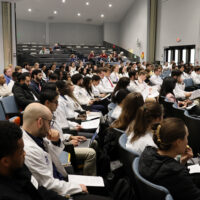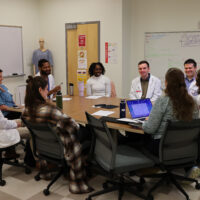A Nationally Recognized Program 🥇
Following innovative and evidence-based teaching practices, our Doctor of Pharmacy program incorporates Interprofessional Education (IPE)—teaching that emphasizes the holistic healthcare team and the collaborative interactions between various healthcare and allied health professionals—throughout the entirety of its didactic and experiential curriculum. Directed by Dr. Tim Brown, PharmD, BCACP, FASHP, our IPE program is nationally recognized for its excellence and well prepares students to be part of complex patient-centered teams using the International Education Collaborative (IPEC) competencies as our standards.
IPE Roadmap 🗺️
Five large-scale, collaborative, and interactive events with other healthcare professional programs make up the backbone of our IPE program. Students first engage actively with IPE during their P1 year during a mass outbreak simulation. In their P2 year, as students’ pharmacotherapy knowledge develops, students engage in two IPE events with physician assistants to create treatment plans for standardized patients over the course of 8 months. Finally, during their P3 year, our PharmD students work with an even wider range of healthcare professionals to treat increasingly complex patients with unique personal, ethical, and values-driven needs. By the time students begin their APPEs in their fourth year, they are exceedingly well prepared to collaborate with not only patients but also other peers and professionals from every sector.
To gain a better understanding, under each link below Dr. Brown walks you through your IPE journey at UGA and explains why we feel it is important for a pharmacists to be valued member of the healthcare team:








